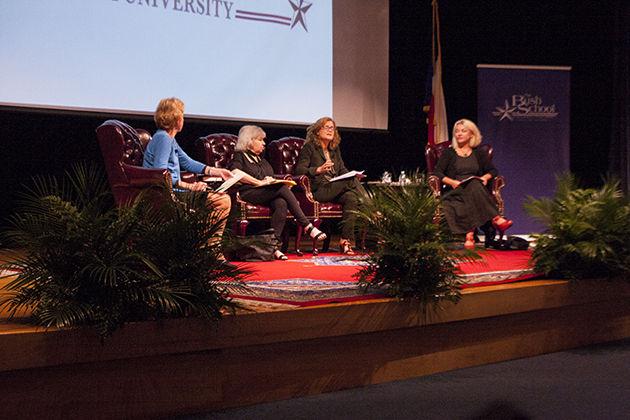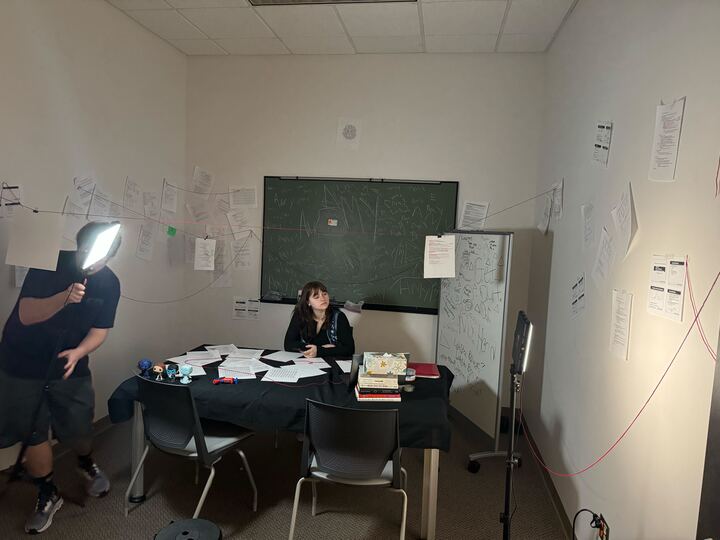War and conflict management, gov- ernmental systems, foreign policy — a number of policy makers and feminist activists agree there is a shortage of women in all these areas.
With this line of thinking, activists and political professionals came together at the Bush School of Government and Public Service Friday to discuss how women are considered in both domestic and foreign matters.
Hitting on topics such as economics, social constructs and war and conflict, panelists dis- cussed changes that should be implemented in societies across the globe.
Feminist activist, author and political analyst Robin Morgan said the efforts to include women in policy are inadequate. Morgan said because of this, the question of how policies might affect women is often not considered.
With this line of thinking, activists and political professionals came together at the Bush School of Government and Public Service Friday to discuss how women are considered in both domestic and foreign matters.
Hitting on topics such as economics, social constructs and war and conflict, panelists dis- cussed changes that should be implemented in societies across the globe.
Feminist activist, author and political analyst Robin Morgan said the efforts to include women in policy are inadequate. Morgan said because of this, the question of how policies might affect women is often not considered.
“It’s fashionable, for example, to speak of having a gender lens — that we have to develop a gender lens of factoring women into things,” Morgan said. “I would submit that we have to do the reverse, that we’d had a gender lens imposed by patriarchal thinking, and we need to strip that off so that we don’t just see half of the world that happens to have penises.”
The underlying reason for conflict in a number of nation states is the level of disparity between men and women, Hudson said.
“What they found was the larger the gender gap in a society the lower the GDP capita of the nation,” Hudson said. “And this was highly significant — strongly significant. The larger the gender gap, the lower the rate of economic growth. When you don’t harness the talents and the energy of fully one-half of your population, you are simply not going to grow as fast as other nations.”
Hudson, co-author of “The Hillary Doc- trine,” said there is also a connection between the level of violence inflicted on women in their nations and these nations’ ability to co- operate and maintain stability.
“In our own studies, we have found that the higher the level of violence against women, the more likely a nation state is to be non- compliant with international norms and its own treaty obligations,” Hudson said. “The higher the level of violence against women, the worse a nation state’s relations with its neighbors.”
An observation made in studies, Hudson said, is the increased success of peace negotiations between nation states when women on both sides are present at the event.
“When women are represented in peace negotiations after a conflict, participants are likely to be far more satisfied with the outcome, and what we’ve also found is that the agreement is significantly more durable,” Hudson said. “It will actually last longer if there is representation of women.”
The global sex ratio, Hudson said, should be around 98 men per 100 women due to the longer life expectancies of women. For some reason however this is not the case.
“What we find now in the 21st century is that that global overall sex ratio is now 101.4 men per 100 women,” Hudson said. “This is a study factoid because what we’re talking about here is literally tens of millions of missing women, some demographers estimate almost 200 million missing women from the world.”
Michele Flournoy, former Under Secretary of Defense for Policy from 2009 to 2012, said interest in these topics is not merely founded in a desire for benevolence, but is based in research. A data-driven argument for why women matter in foreign policy is what should be presented, Flournoy said.
Speakers at the conference also hit on the topic of militaries — both foreign and domestic — and how to disable the sexual mistreatment of women and men in their ranks.
Flournoy said sexual assault within military systems is a horrendous and unacceptable problem.
“I think we have to have a zero tolerance policy,” Flournoy said. “The big debate is whether to try to strengthen, handle this with a chain of command but supplement that with advocates for the victims, better accountability, etcetera. Or take this out of the chain of command and create a separate system of justice to get after this.”
Flournoy said holding offenders and commanders accountable is key to overcoming this problem.
There is hope for change however, said political activist Gloria Steinem, who skyped into the conversation Friday. Throughout her decades of activism, she said she had seen progress through the small actions she’d taken in striving for gender equality in policy making.
“When you’re as old as I am and you’ve seen change, that makes you hopeful,” Steinem said.
The underlying reason for conflict in a number of nation states is the level of disparity between men and women, Hudson said.
“What they found was the larger the gender gap in a society the lower the GDP capita of the nation,” Hudson said. “And this was highly significant — strongly significant. The larger the gender gap, the lower the rate of economic growth. When you don’t harness the talents and the energy of fully one-half of your population, you are simply not going to grow as fast as other nations.”
Hudson, co-author of “The Hillary Doc- trine,” said there is also a connection between the level of violence inflicted on women in their nations and these nations’ ability to co- operate and maintain stability.
“In our own studies, we have found that the higher the level of violence against women, the more likely a nation state is to be non- compliant with international norms and its own treaty obligations,” Hudson said. “The higher the level of violence against women, the worse a nation state’s relations with its neighbors.”
An observation made in studies, Hudson said, is the increased success of peace negotiations between nation states when women on both sides are present at the event.
“When women are represented in peace negotiations after a conflict, participants are likely to be far more satisfied with the outcome, and what we’ve also found is that the agreement is significantly more durable,” Hudson said. “It will actually last longer if there is representation of women.”
The global sex ratio, Hudson said, should be around 98 men per 100 women due to the longer life expectancies of women. For some reason however this is not the case.
“What we find now in the 21st century is that that global overall sex ratio is now 101.4 men per 100 women,” Hudson said. “This is a study factoid because what we’re talking about here is literally tens of millions of missing women, some demographers estimate almost 200 million missing women from the world.”
Michele Flournoy, former Under Secretary of Defense for Policy from 2009 to 2012, said interest in these topics is not merely founded in a desire for benevolence, but is based in research. A data-driven argument for why women matter in foreign policy is what should be presented, Flournoy said.
Speakers at the conference also hit on the topic of militaries — both foreign and domestic — and how to disable the sexual mistreatment of women and men in their ranks.
Flournoy said sexual assault within military systems is a horrendous and unacceptable problem.
“I think we have to have a zero tolerance policy,” Flournoy said. “The big debate is whether to try to strengthen, handle this with a chain of command but supplement that with advocates for the victims, better accountability, etcetera. Or take this out of the chain of command and create a separate system of justice to get after this.”
Flournoy said holding offenders and commanders accountable is key to overcoming this problem.
There is hope for change however, said political activist Gloria Steinem, who skyped into the conversation Friday. Throughout her decades of activism, she said she had seen progress through the small actions she’d taken in striving for gender equality in policy making.
“When you’re as old as I am and you’ve seen change, that makes you hopeful,” Steinem said.









